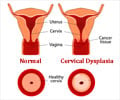A simple test for cervical cancer, designed to be used in developing countries, could strike a massive blow against the disease notorious as a "silent killer" of women, doctors said on Sunday.
Screening for cervical cancer is routinely done in rich countries and has helped cut mortality from this disease in advanced economies by between 50 and 80 percent.But the technique requires access to sophisticated labs, which makes it unsuitable for countries that lack financial resources and medical infrastructure and may not even have electricity in remote areas.
Researchers said a prototype of a straightforward, affordable test had been tested in trials among nearly 2,400 women in rural China and proved to be highly accurate.
Pap smears identified as pre-cancerous by lab screening were spotted by the device 90 percent of the time. It was also 84.2 percent accurate in identifying samples that were not precancerous.
The gadget, called careHPV, amplifies telltale strands of DNA found in the human papillomavirus (HPV) which causes cervical cancer. It is a spinoff of a lab technology called Hybrid Capture 2.
Able to detect 14 high-risk types of HPV, the mini-lab needs an area of clean benchtop workspace that is about the size of a tabloid newspaper.
Advertisement
The test results come in around two and a half hours, which means a woman can be screened and given help in the same visit if need be.
Advertisement
One of the authors, John Sellors of McMaster University in Hamilton, Ontario, said the results were "very promising."
"If women 30 years and older could be screened at least once in their lifetimes with such a test, and appropriate treatment administered at the same visit, public-health programmes would be affordable and deaths from cervical cancer would be reduced by a third," he said.
More than 270,000 women die from cervical cancer each year and 493,000 new cases are diagnosed each year, more than 80 percent of them in developing countries.
careHPV was devised by Digene Corp., now called Qiagen NV, and a US NGO called the Program for Appropriate Technology in Health, or PATH. The project was funded by the Bill and Melinda Gates Foundation.
Health campaigners are also striving to roll out the new HPV vaccine in poor countries, in line with vaccinations of girls of puberty age in rich economies.
Source-AFP
SRM














